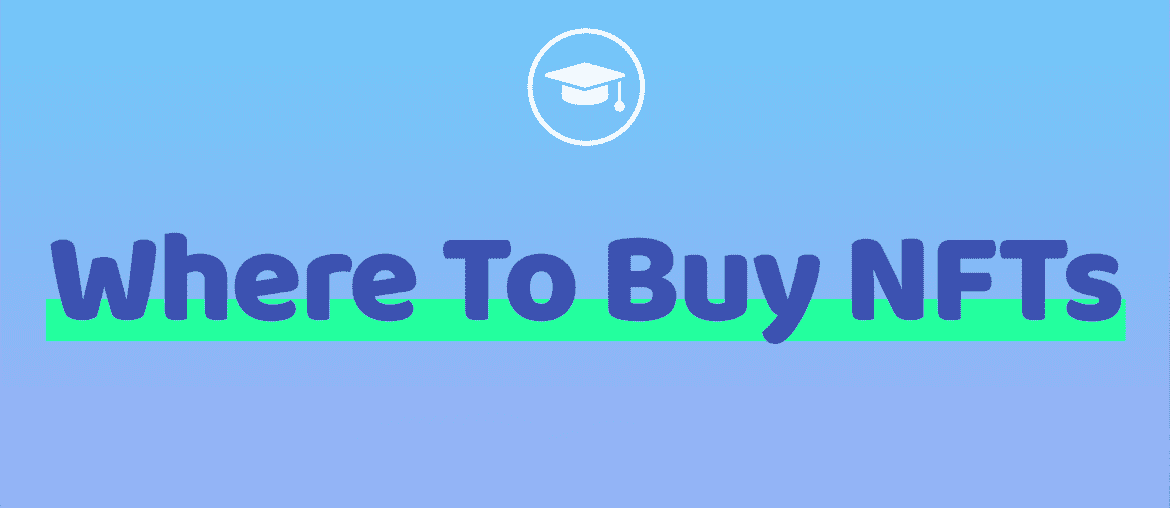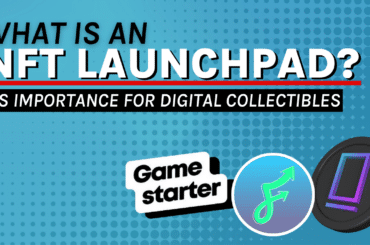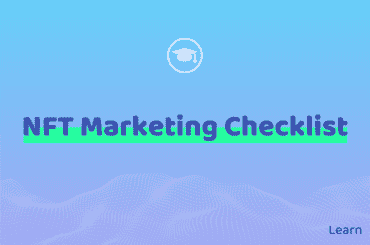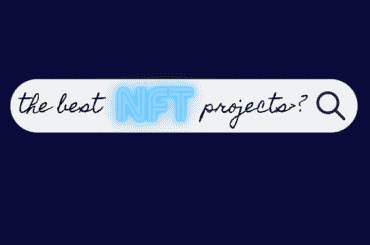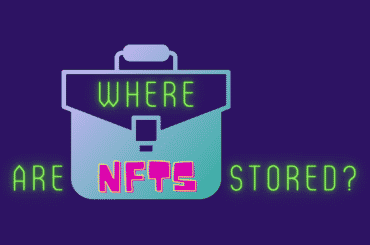If you are ready to buy your first NFTs, but aren’t sure even where to begin, it is ideal to first understand the ins and outs of the marketplace, how an NFT works, and what precisely you are buying. Where does one buy an NFT? How much do they go for? And, why, ultimately would someone buy or want to own an NFT.
We will break down those tough questions, helping you to better understand this chaotic market, and make an informed decision should you choose to make your purchase.
Table of Contents
What Is an NFT?
If you are going to buy one, it is ideal to know exactly what you are getting yourself into before doing so. NFTs are non-fungible tokens. A token is something that represents something else.
A Token
You can think of tokens in the cryptocurrency exchanges much like tokens in the real world. Such tokens are much like the kind you likely had rattling around your pockets as a kid. If you went to the arcade, many had their own “native currency.” You didn’t go jamming quarters into video games but instead had to take your fiat currency (your government-backed, legal tender like the US Dollar), slip it into a machine, and out came golden coins called tokens.
Those tokens, while allowing you to play an assortment of video games whilst inside the arcade, didn’t have much value out on the street. Likewise, in many crypto exchanges, a token may only have value on its platform.
In the case of the NFT, these tokens can represent nearly anything the imagination will allow for, from a digital file to a piece of real estate. The NFT itself is the proof of ownership, the item, and a verified and immutable lock all in one.4
NFTs as Digital Art
The NFT made its early splash in the marketplace as digital art, and still today many NFT transactions revolve around the goal to purchase artwork. Responsible for a large percentage of the NFT craze, many digital collectibles still focus on just that: art.
From digitized kittens to strange punks and skulls, there is a crazy variety of “art” out there on the various NFT marketplaces. And, just like art in the “real world,” its interpretation is left, as they say, to the “eye of the beholder.”
Some digital art sold as NFTs can be video clips or moments, such as those sold on the NBA Top Shot marketplace. Others can be .mp3 and .mp4 files of musical videos or songs, released exclusively to select markets. Just like there is a wide variety of physical art, so too are there plenty of styles of digital artwork.
Owning these digital pieces of art can be done for an equally wide variety of reasons. Some people purchase an NFT to simply enjoy it and take pride in its ownership (i.e. bragging rights), while others do so for investment purposes. Again, similar to the art in the tactile, physical world, digital art can be a lot of things to a lot of people.
NFTs as ‘Real World’ and Digital Assets
While art can most certainly be an asset itself, there is also a wide world out there where an NFT represents an assortment of assets, in both the digital and “real” worlds. The technology behind the NFT is what makes its function possible, and that same tech leaves the door wide open to interpretation.
Allowing an asset to be represented by a token means that it is more easily traded and discussed in a marketplace. Even when they are non-fungible tokens, meaning they have no precise equal, the use of them on an exchange creates a “language” that users can speak to conduct transactions.
Non Fungible
Non-fungible is a very fancy way to say that something is unique. It shares no asset of equal value. There is no item that is precisely the same. It is the opposite, simply the word fungible, means that it is able to be swapped, traded, for something of the exact same value and worth.
Fungible items are able to be divided, as well, where non-fungible tokens are not. In the crypto space, these terms are often used to explain if something is a general commodity, which can be easily equated to one another, balancing the trading playing field (i.e. fungible), or not, an NFT which is unique and has no comparable equivalent.
How To Buy an NFT
To purchase an NFT, you will need to take a few other basic steps first. Having the right tools in place before your purchase will make the transaction smoother for all involved. By doing your research upfront, you are wisely making a choice to be prepared for your endeavor.
Select a Digital Wallet
A prerequisite for making any transactions on the NFT marketplace is to first obtain a crypto wallet. No matter where you choose to take your business, this will be a required tool.
What Is a Digital Wallet?
A crypto wallet, or digital wallet, is the place you will typically store your purchased NFTs. It is also the space that holds your private keys.
In order to do transactions online, this wallet is required as a sort of an account. Much like an online bank account, except without the bank, this digital wallet will contain your private keys, which only you have access to, as well as a public-facing account to allow others to pay you.
Much like a money-sharing site such as Venmo, most digital wallets will allow you to obtain a QR code or a straight series of numbers, which you can share with a buyer, for example, on the marketplace. That way, they can send you payment, but never at any time are permitted to know your private keys.
Your private key will be the way you lock up your accounts, keeping your digital assets safe and away from prying eyes. Selecting a digital wallet is like picking out the safe where you will keep your valuables. Selecting a method of security that works best for your lifestyle is a smart way to keep these items safe. Thankfully, you have a variety of choices out there.
Types of Digital Wallets
When selecting your first crypto wallet, which you will need to purchase your first NFT, you will notice you have quite the number of choices before you. First, you will want to select the type of wallet you want to use. Each has its pros and cons and selecting one that works for your unique needs is an important step in the purchasing of an NFT.
Hardware Digital Wallets
A hardware wallet is a removable device that can be carried about, much like a thumb drive. Connected via a USB port, these crypto wallets allow for what is known as “cold storage” of your accounts. In other words, the information is not stored on the worldwide web, but instead on a device you own, you store, and you use when and as you see fit.
With popular brands like Ledger Nano S or Nano X, as well as Trezor’s line of products, the benefit of these devices is that they offer an added layer of security because they are not stored online. However, you must trust yourself to keep track of the small, removable device, roughly the size of a pocket knife. Without this wallet, you will lose access to your digital assets, so it is important that you ultimately consider yourself a reliable person to hold such an important, and small, item.
Software Digital Wallets
A software crypto wallet is downloaded programming that will ultimately “live” on your own devices, such as a desktop, laptop or mobile phone, or tablet. The pros of such wallets, sold under the names like MetaMask wallet, Gemini, Exodus, and Mycelium.
Depending on your needs to be mobile, these can be a strong pro for your on-the-go lifestyle, offering you access nearly anywhere you travel. However, this same feature can create a greater security risk, should you lose your device, not to mention connect to the Internet via open wireless access points.
Such wallets rely on “hot storage,” or for your information to be accessible via the Internet. While this adds to your ability to access it, so too does it allow for hackers to potentially find a weak point.
Paper Wallets
In a term that almost sounds like an oxymoron, a paper digital wallet is one that requires just that: a pen or pencil, and a piece of paper. It may sound bizarre that such a technology-laden industry like cryptocurrency exchanges could rely on or advocate for the use of old-school pen and paper, but many find comfort in its security features.
By placing your private information on a piece of paper, or printing and saving a QR code on paper, you know that your items are not on and never on the web, creating a level of security to prevent hacking or malware.
These types of wallets again rely on an owner to keep the paper itself safe, and not to lose it. Again, these private keys are your only way into your digital assets, and without them, you may be locked out of your NFTs and crypto for good.
Select an NFT Marketplace
Now that you have the tool you need to get started, you will want to select an NFT marketplace that suits your needs. To do so, it is wise to first do some mental groundwork to assist you in making your decision.
For every wildly varied type of NFT out there in the world, there too is a marketplace for that exchange. A marketplace, to be clear, is the space in which you will do your buying, selling, and/or trading of NFTs. It is the “store” where you will go to make your purchase.
As previously discussed, there are a wide variety of reasons you may want to purchase an NFT, and understanding those reasons can help you more carefully select which marketplace makes the most sense for you.
Why Do You Want To Buy an NFT?
Analyzing why you want to purchase an NFT is a smart first question to ask. Are you seeking to own something just for the joy or pleasure of it? Are you hoping to find something unique and rare, giving you bragging rights or unique use of a piece? Or are you looking into NFTs as a financial investment? Are you hoping to hold on to the NFT long-term? Or are you going to do some rapid flipping on a volatile market in hopes of striking it rich?
Additionally, buying an NFT is not all one can do on the open NFT marketplace. Are you planning to also sell NFTs? Selling NFTs requires features that may differ from those a buyer seeks. Do you hope for an auction system or require a decentralized auction house for your sales? Or will NFT sales not be an early priority at all? Knowing the types of NFT transactions you aim to make will go a long way in examining features on different NFT platforms.
Answering some of these “why” questions can direct your answer to the “where.” There is a very, very large assortment of NFT marketplaces out there. You will have a long list of choices before you, but knowing your “why” will surely help.
What Kind of NFT Do You Want to Purchase?
Knowing the “why” of your purchase is important, and so too is the “what.” What are you aiming to own? As previously mentioned, there are as many NFT types as imaginations out there. Narrowing down your search by types of NFTs can help you stay focused in the deep ocean of choices.
For example, there are marketplaces for NFTs created strictly around a genre. Loud Market LTD, for example, which came onto the scene in late 2021, is focused completely on the musical industry. These tailored marketplaces are geared to niche customers, seeking very specific NFTs to own and enjoy.
Likewise, there are exchanges such as the newly formed AP Market that combined the technology features of Xooa with 175 years of photojournalism tradition of the Associated Press to bring buyers very unique and exclusive access to owning even Pulitzer-prize-winning images. You won’t find digitized cats here, but instead professionally shot, stunning photography.
Having a good understanding of what you seek to purchase will help you to narrow down the miles-long list of marketplaces by understanding which circles are best known for which NFTs.
Shop Around
Choosing one that is best for you can be difficult at the start, but keeps in mind too, that you have the ability to make this choice. You also have the ability to change your mind.
Most marketplaces don’t per se charge a fee in order to simply jump on, create an account, or peruse the wares. This means, much like window shopping in a physical world mall, you can also “shop” to your heart’s content online, looking where you please, until you find the fit that works best for you.
A Trusted Brand
Wherever you decide to take your dollars, another important consideration in selecting your marketplace is to weigh the history of the space itself. In an ever-changing industry, full of highly volatile exchanges, the world of NFTs and crypto can be a wild west of chaos.
By doing your due diligence about the marketplaces you opt to do business with, you can prevent many headaches in the long run. Some of the longest-running marketplaces can provide security in their existence being tried for longer periods of time than their counterparts. In other words, the longevity of a site can show that it has stood the test of time.
Do, however, keep in mind that “longevity” in the case of NFT marketplaces can still only mean a handful of years. This is an industry still very much in its early stages, and the future remains to be seen. There are no guarantees in the investment game, but knowing that there is some history, or minimally a large base of users, can provide some peace of mind knowing they are not a fly-by-night operation, lowering the fear and risk of your investment.
Today’s Top NFT Marketplaces
Once you’ve done the extensive groundwork, you can start to understand where your focus needs to be when making your NFT purchase. Armed with your digital wallet, you can check out some of the biggest names in the business. These exchanges have stood the test of time, well, at least in NFT terms.
With a major baseline of users, huge trading volumes, and proven track records, these are some of the top choices on today’s NFT marketplace list:
- OpenSea
- Axie Marketplace
- Rarible
- Mintable
- SuperRare
- Nifty Gateway
- Foundation
- NBA Top Shot
- Larva Labs
and the choices go on and on. As you can see NFT collectors have plenty of choice in an open marketplace of where to take their dollars.
Deciding which NFT marketplace is best for you is a very unique and personal solution. As varied as the digital asset choices themselves, so too are the uniqueness of selecting a marketplace to fit your personal needs.
The Future of the Marketplace
No one can be sure where the NFT marketplace is headed. It is a new space, that is still finding its footing and defining its existence. Clearly, there are many choices for making transactions online, and more options to buy and sell NFTs come about each and every day.
Focusing on your priorities, your personal goals, and knowing precisely what you aim to buy and sell on the NFT marketplace can greatly help you narrow down your search.
Stay informed with researched resources courtesy of FLOLiO. As they say in G.I. Joe, “knowing is half the battle.” Stay in the know with information you can trust, and your risks on the NFT marketplace won’t be nearly so dangerous.

